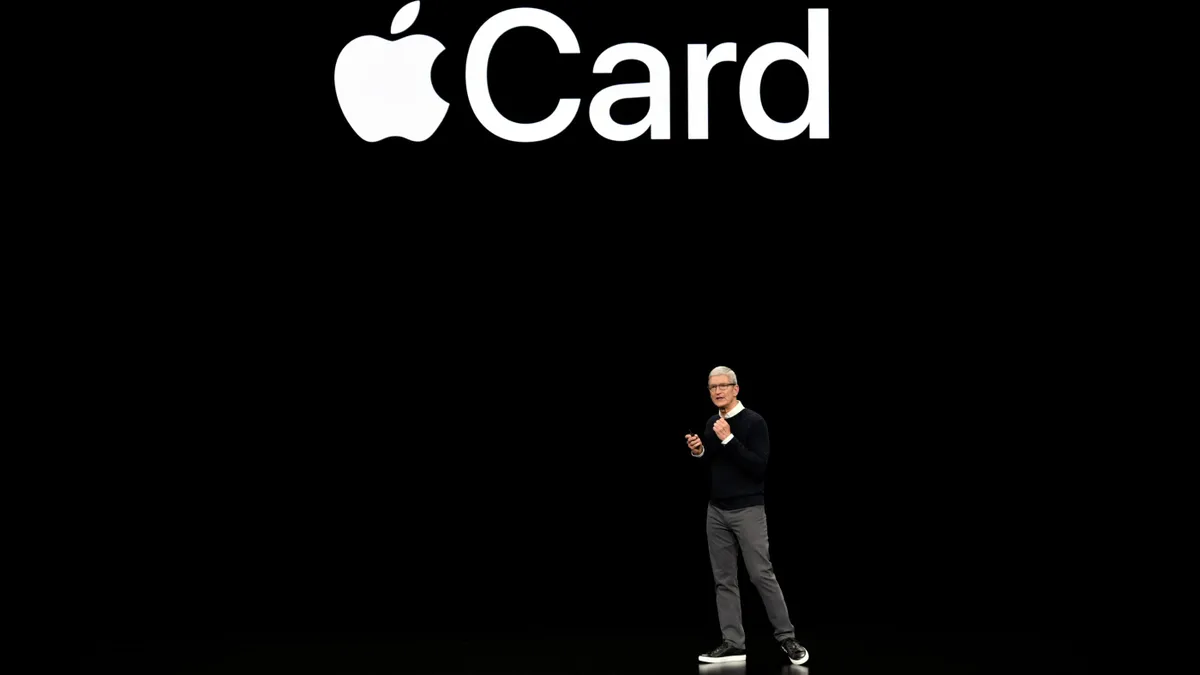As Visa seeks to displace Mastercard as the network for Apple’s branded credit card, one analyst group is giving both of them the edge over another contender, American Express.
Visa has offered a $100 million payment to tech titan Apple to win that card business, The Wall Street Journal reported Tuesday, citing unnamed sources.
Apple is looking for a network as well as a bank card issuer, but it’s likely to pick a network first, the newspaper said. Amex, which also operates a bank, could act as both issuer and the network provider for Apple’s credit card.
While Goldman Sachs is the current bank issuer for the Apple card, it has been seeking to drop the contract because it hasn’t been financially positive, according to TD Cowen Securities analysts who discussed the Apple situation in a note to their clients Wednesday. The Apple card portfolio has had “high losses” of more than 7% for Goldman, the analysts noted.
Visa and Mastercard’s extensive connections to card issuers that offer cards on their networks likely give them a leg up over Amex in their ability to aid Apple in hunting down a new bank issuer for Apple’s card, the TD Cowen analysts said following the Wall Street Journal report.
San Francisco-based Visa operates the largest U.S. card network, with Purchase, New York-based Mastercard as its No. 2 network rival. A spokesperson for Mastercard declined to comment on the Apple issue while spokespeople for Amex, Apple and Visa didn’t respond to requests for comment.
The TD Cowen analysts said they believe Visa and Mastercard “have some advantage over (American Express) on the network piece, given (Visa) and (Mastercard’s) broad relationships with almost all card issuers.”
Also, the demographics of Apple’s current card clientele might be less attractive to Amex, the TD Cowen analysts noted.
Apple had about 12 million cardholders with about $17 billion in receivables as of last September, with cardholders averaging less than $1,500 balance on their accounts, the TD Cowen analysts noted. That means that Apple’s client set is likely not a high-income, high-spending crowd, the analysts said.
Amex tends to favor affluent customers who are big spenders. If Visa or Mastercard wins the network contract, the analysts also said that would decrease the probability of Amex being the issuer because they didn’t know of a situation where Amex was the issuer for a card that used a competing network.
Synchrony might be a more likely issuer for the card, given its experience with other digital-first card programs, including for PayPal and its Venmo brand, the TD Cowen analysts said. In addition, the portfolio might be more attractive to Synchrony in that it has more experience with low-income cardholders. Chase and Barclays are also contenders, the analysts said.
Visa and Mastercard may also be the preferred choice for Apple in light of their card tokenization technology, the analysts said. That technology allows for better fraud prevention and packs more data, among other benefits. Tokenization from Visa and Mastercard could be particularly beneficial for Apple in that the contract is about servicing the card as well as the tech company’s Apple Pay digital wallet. That makes it more attractive to the networks too.
“Because Apple's portfolio will have more tokenized transactions, that portfolio will be coveted,” industry consultant Ken Musante said by email. “Cardholders have taken a deliberate action to load their card in Apple's ecosystem which increases transactions from that card while increasing allegiance.”
In any case, finding an issuer for the Apple card will be the tougher task, the TD Cowen analysts said.
“Given the portfolio’s performance as well as the requirements that Apple placed on the card, coupled with a large portfolio that is not achieving financial objectives will make it harder to find an issuer than a network,” the analysts’ note said.


















